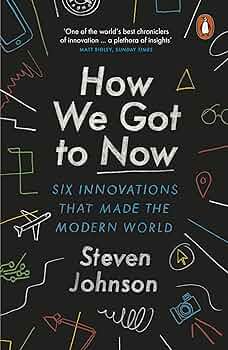IB Paper 2 - 7. Origins, development and impact of industrialization (1750–2005)
Steven Johnson - How we got to now (2014).
Steven Johnson - How we got to now (2014).
|
Six key innovations that have had a profound impact on society. Throughout the book, Johnson emphasizes the idea of the "hummingbird effect," where seemingly unrelated innovations and ideas converge to create unexpected outcomes.
"How We Got to Now" provides a unique perspective on the history of technology and innovation, highlighting the complex web of connections that have shaped the world we live in today. |
|
|
Innovation expert Steven Johnson traces the surprising journey from dirty to clean in human lives. He discovers the unsung heroes of this transformation, like the doctor who secretly experimented with a deadly chemical to treat the water supply.
|
|
|
From submariners who live on an 18-hour day to the railway clerk who fought to standardise time zones, and the cobbler who invented the first cheap watch, innovation expert Steven Johnson discovers the surprising journey of time in our lives.
|
|
|
The invention of the mirror gives rise to the Renaissance; glass lenses reveal worlds within worlds; glass is essential for communication in the deep ocean; glass lens allows millions to watch a man walk on the moon.
|
|
|
Only a few centuries ago, that the best source of light came from burning oil scooped out of a whale's head. Steven Johnson discovers the unsung heroes of invention in the journey from the candle to the neon lights of Las Vegas.
|
|
|
Steven takes a look inside the ice hotel of North America, and tries to discover when man first conquered the cold, which turns out to be fairly recently.
|
|
|
Steven traces the unsung heroes of sound, like the French printer who first recorded the human voice, the inventor who made radio possible through a mistake and the Hollywood star who used the keys of the piano to inspire encrypted messages.
|

